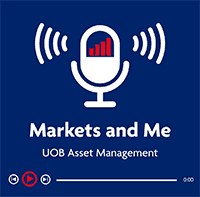Key Highlights
- Tech stocks take hit from rotational play on bond yields rise
- Fed chair reassures markets that inflation will be kept in check
- Asian equities may also benefit from rotational play
Presented by: Edwin Lee, Senior Director, UOBAM Malaysia

Full transcript:
Hi, I am Edwin Lee, Senior Director at UOBAM Malaysia with this week’s take on the markets and what may drive markets in the weeks ahead.
The major Wall Street indices closed mixed last week with the S&P 500 up by 0.8 %, the 30-stock Dow by 1.8% while the tech-heavy Nasdaq Composite fell 2.1% after the Big Techs fell out of favour with cyclical stocks gaining the upper hand from rotational play.
Some of the once red-hot tech stocks have come under selling pressure as the quickened pace of rising bond yields has undermined the case for holding high-priced shares by lowering the relative value of companies’ future cash flows thus hurting growth shares.
That has dragged Nasdaq – which had earlier rose more than 10% this year – into bear market territory as more investors fearing more volatility ahead have decided to take profits on earlier gains. Tesla shares for example have backtracked by some 25% this year with sell-offs in Innovation ETFs also contributing to its heavy decline.
Other segments hit include biotechs and clean energy which had enjoyed strong investors’ inflows recently.
With US economic data picking up and the passing of the $1.9 trillion fiscal stimulus likely to be signed by President Biden as early as this week, expect more cyclical stocks to come into play especially when the Biden administration signaled that herd immunity may be possible as early as May with more Americans getting vaccinated at the rate a 2 million a day.
Fed Chair Jerome Powell has meanwhile try to reassure investors that the central bank would keep surging bond yields and inflation expectations in check – noting that price increases above the Fed’s 2% target for a couple quarters or more would not cause consumers’ long-term inflation expectations to materially change.
Some investors though may have been disappointed that Powell didn’t make a strong hint of any changes in asset purchases by the Fed to contain the recent rapid rise in rates bond yields which hit as high as 1.62% last week, up from below the 1% mark at the start of the year.
The late rebound in US equities on Friday does not however mean the recent market weakness is quite over yet, but that there is now a divergence between tech and cyclical plays though the overall bullish outlook remains intact.
Meanwhile, last week’s announcement of about a shakeup in the Hang Seng Index in Hong Kong is also seen as a “positive move” in that that could help diversify risks. The Hang Seng has risen more than 9% since January.
That is because the changes in the constituent stocks will increase exposure of the Hang Seng to more economy sectors including those in China which allows for better diversification which may attract more capital flows that track the benchmark index.
Asia equities will likely to be also gaining favour from global rotational play due to their lower valuation compared to US peers, as well as from North Asia to ASEAN stocks in the near term. Thank you for tuning in and we will see you next week.
Stay safe, stay healthy and stay united.




